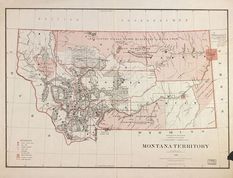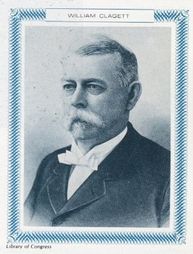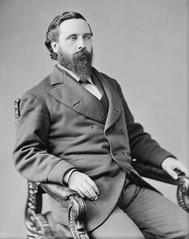 Montana Territory in 1879
Montana Territory in 1879 The majority of Montanans today have no idea who those two men are, nor do they care. It’s unfortunate, and it’s probably one of the reasons we have so many out-of-state interests pulling our purse strings and choosing which candidates we’ll vote for.
Things weren’t a whole lot different in the 1870s and 1880s, back when the territorial legislature was still putting officials in office. But that system also led to breakdowns, such as when Montana had no senator for several years in the 1890s. The 17th Amendment finally did away with the practice altogether, allowing voters to choose who’d represent them.
Before then, however, it was still the days of the good ‘ol boys, and that’s why men like these were chosen to represent common Montanans.
William Horace Clagett (1871-3)

He passed the bar in 1858 and returned to Iowa to practice, then headed west to Nevada in 1861. He became a member of the Nevada Territorial House of Representatives in 1862 and then the Nevada Assembly in 1864.
By the mid-1860s he headed up to Montana Territory and once again practiced law. He was popular enough that the people chose him to represent them in Washington, and he was elected to the U.S. House of Representatives in 1870 as a Republican.
It was while serving in the House that Clagett probably did the most for Montana. On December 18, 1871, he introduced the Act of Dedication bill, which led to the creation of Yellowstone National Park.
The park wasn’t very popular in Montana at the time, however, and Clagett lost his reelection bid to Martin Maginnis in 1872. He headed back to Montana but suffered some serious wanderlust and practiced law in most of the western states. In 1889 he was president of the Idaho Constitutional Convention and tried to get elected to the U.S. Senate from Idaho in both 1891 and 1895, but failed each time.
He finally settled down in Spokane, Washington, and worked at the law until his death on August 3, 1901. He was 62 years old.
Martin Maginnis (1873-85)

When the Civil War broke out Maginnis joined the Minnesota Volunteer Infantry Regiment and rose all the way to major by war’s end. In 1866 he and his brothers moved to Helena and got started in mining. Maginnis’ newspaper skills got him with the Helena Daily Gazette, and his and Wilbur Fisk Sander’s Helena Herald battled it out for the hearts and minds of the citizenry.
Maginnis proved better at it, and he was elected to the U.S. House of Representatives in 1872, a position he’d be reelected to five times, finally stepping down in 1885. He tried again for the seat in 1890, but lost to William Dixon. Instead he was given the Commissioner of Mineral Land of Montana position, which he held until 1893.
He stayed in Montana until 1915 when his health forced him to warmer climes. He moved to Los Angeles, California, where he died on March 27, 1919. He was 77 years old.

